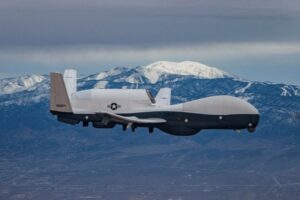Northrop Grumman on Thursday announced it demonstrated the ability of a navigation system used by a MQ-4C Triton unmanned aerial vehicle to operate at high latitudes within the Arctic Circle.

An MQ-4C named B8, the first production MQ-4C Triton upgraded to the IFC-4 configuration flies over California. It was delivered to the Naval Air Station Patuxent River, Md. on Feb. 1, 2022. (Photo: Northrop Grumman)
The company told sister publication Defense Daily this demonstration test flight used a company-owned manned aircraft with a mounted Triton navigation system. It started in Deadhorse, Alaska and flew within 100 miles of the North Pole.
The navigation system included the mission management computer and upgraded operational flight programs to demonstrate the Triton’s ability to navigate that far north.
The aircraft collected data over a five-hour flight, remaining in U.S. and Canadian airspace.
The company said this demonstration also validated ground-based GPS alignment and initialization procedures to allow operations from runways above 70 degrees north latitude.
Northrop Grumman also told Defense Daily this demonstration validated the hardware and software capability that currently exists on the MQ-4C.
Northrop Grumman argued this delivers on its commitment to provide intelligence, surveillance, reconnaissance and targeting capabilities in the High North, operating in the austere environment of the Arctic Circle.
The Triton itself is able to operate at altitudes over 50,000 feet for over 24 hours at a time. The company noted this means it can operate above harsh Arctic winds and avoid the speed and range impacts that limit performance at more medium altitudes in the 10,000-30,000 feet range.
This came after similar demonstrations over the Gulf of Alaska in summer 2023, including testing the Triton radar during the Northern Edge 2023 exercise.
The U.S. Navy and Royal Australian Air Force operate the MQ-4Cs.
A version of this story originally appeared in affiliate publication Defense Daily.






